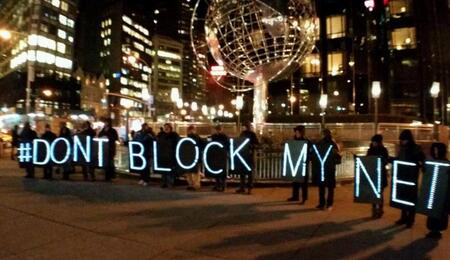What Does Net Neutrality Mean for Legal Cannabis?

The uncertain fate of net neutrality is a hot button issue across all industry sectors, and the emerging legal cannabis market is no exception.
The free flow of information faces its greatest threat since the superhighway found its way to the masses — this is a big deal for cannabis. Few things have helped marijuana change its cultural identity from Spicoli falling out of a van to Sanjay Gupta watching cannabis end a child’s seizure than the internet. So any changes to how it works could have major impacts on the emerging legal industry. “Net neutrality” is a popular term these days. The basics (for the uninitiated) are this: internet service providers currently have to treat all data on the internet the same, no matter where it’s from. Say you want to look up Sprint phones on your Verizon smartphone — net neutrality prevents Verizon from making the competing Sprint website load at speeds so slow you may have been better off with a carrier pigeon. But could this possibly have an effect on the pot industry? The possibilities are endless — just take Instagram. Want that bud shot to load a bit faster, or get that auction sniping comment in on time to get that sweet Mothership? Imagine having to pay an entry fee just to get into the auction: Your ISP could very well charge you extra to access Instagram at reasonable speeds, otherwise, you’ll be lucky if your videos upload before your phone battery dies. It could get far more nefarious than that of course. The cannabis industry is synonymous with big data. These days, in many cases, distributors are using seed to sale tracking systems they rent as software, which means massive quantities of streaming data. All the information that’s required to change hands by law could end up being a potential cash cow for ISPs, and without specific protections from this, it only takes one clever capitalist. Most importantly, what impact will net neutrality have on the democratic process — will we achieve a whole new level of pay to play politics, making it nearly impossible to organize at the grassroots level for change? If not for those grassroots activists online, many places where cannabis laws have changed drastically in the past two decades would still be singing a different tune — it goes handcuffs, handcuffs, cha, cha, cha.“One of the main reasons that we’ve been able to build majority support for legalization so quickly over the past decade is because of the rise of social media and the internet more broadly,” Altieri said. “By removing information gatekeepers from the equation, Americans were able to more readily access information and do their own research on the benefits and risks of reforming our nation’s marijuana policies and to easily organize fellow supporters to take action.” Altieri believes If we lose true net neutrality in this country, it will have a broad and debilitating effect on the ability of — not just the marijuana legalization movement — but all social movements that are working to educate the public and rally support for their cause. “Our nation should be looking for more ways to open up access to information, not implementing policies that would hinder the free flow of knowledge for the benefit of the few companies who control the telecommunications industry and major media,” he said. “NORML stands fully in support of the struggle to ensure the continued existence of net neutrality.” Change.org is among the organizations spearheading the effort to save net neutrality. Their Director of Campaigns and Partnerships, Jonathan Perri, pointed to the struggles cannabis efforts have already had to deal with just around regular campaign practices online. “Without strong net neutrality rules, it’s completely possible that an ISP could block the website for a political campaign or online petition that they disagree with,” Perri said. “Considering that campaigns for marijuana legalization have run into online advertising troubles before, net neutrality is important for these movements.” The Electronic Frontier Foundation has also helped lead the fight to save net neutrality for years. EFF Staff Attorney Kit Walsh told Cannabis Now the cannabis industry highlights multiple major impacts that could happen. “First, small businesses rely on their customers’ being able to reach them,” Walsh said. “When the big incumbents — either within the cannabis industry or in the tobacco or alcohol business — are able to pay for better access, that helps them cement market dominance and hurts small business. Second, cannabis legalization is a politically contested issue. Nonprofits and grassroots organizations are at a disadvantage on a non-neutral internet because moneyed interests on the other side can pay for a leg up. Repealing the current net neutrality protections would mean that small players have less of a voice.” Etienne Fontan helps lead one of the internet’s most beloved weekly pot chats, Hash Church, and is a co-owner of one of the nation’s top dispensaries — Berkeley Patients Group. He’s also chaired the board of the National Cannabis Industry Association, which he still serves on. We asked Fontan what he believed the end of a free internet might mean to the industry he has served in since the beginning. “The freedom to speak freely and openly is key to the further success of the cannabis market as a whole,” Fontan said. “With states considering censoring and not allowing producers, manufacturers and growers to advertise, it sets a dangerous precedent.” Fontan added that net neutrality is key to allowing all people to capitalize on the new found freedoms of decriminalization. “Censorship harms everyone, and if pharmaceutical companies and alcohol companies — including hard liquor — [can advertise], then we should have an equal seat at the table,” he said. For Cy Scott, the CEO and co-founder of Headset, not having a free and open internet is a “real negative for the nation and for the cannabis industry.” “The cannabis industry already has a number of difficulties, from banking to insurance to legislation issues,” Scott said. “Adding having to negotiate for preferred data rates is one more compounding element that makes operating in this market even tougher. The cannabis industry is one of startups, and startups have the most to lose with the removal of net neutrality.” SOURCE Cannabisnow.comErik Altieri, Executive Director of the nation’s oldest cannabis reform organization, NORML, said the chilling effect on grassroots activism could be pronounced.
S
Soft Secrets



